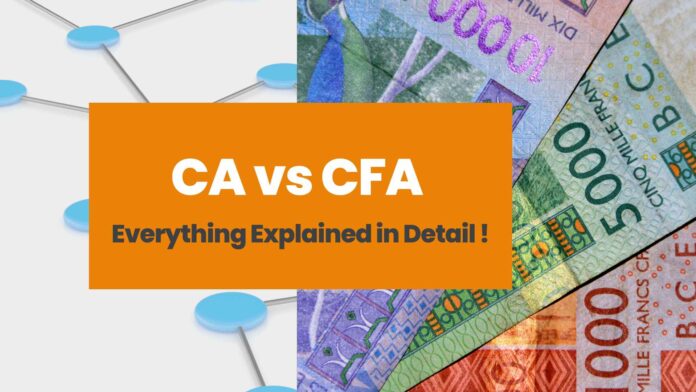Introduction
CA vs CFA what do you think is better? Let’s find out.
Are you considering a career in finance but unsure of which Chartered designation to pursue? You may have heard about the Chartered Accountant (CA) and Chartered Financial Analyst (CFA) programs, and are wondering about the differences. This blog section aims to provide an introduction to CA vs CFA – explaining the difference between them, and exploring the diverse career opportunities available.
Firstly, let’s look at what the prime differentiation between CA vs CFA is. A Chartered Accountant (CA) is an individual who has successfully completed professional accounting examinations in their country of origin, followed by a period of professional experience in their chosen field.
They can provide a range of services such as auditing, taxation advice and business consulting. In contrast, a Chartered Financial Analyst (CFA) is an individual who has completed the CFA program – a rigorous self-study program that covers topics such as investment analysis, portfolio management and ethics.
Although both designations are valuable for those pursuing careers in finance, they offer different opportunities for professionals depending on their interests. A CA may focus on accountancy or audit services while a CFA is best suited to roles such as investment analysts or portfolio managers. It is important to note that there are many other careers available that involve either one or both credentials – including corporate development roles or asset management so it is worth exploring these options further before making your decision.
Qualifications for Becoming a CA or CFA

If you’re interested in the world of finance and accounting, you may have heard a debate on the Certifications of CA vs CFA. With both qualifications now popular among professionals, it can be hard to decide which one to pursue. In order to help you make an educated decision, we’ll take a look at what each certification has to offer and compare them with one another.
The CA qualification is a two-year Certification in Accounting that was created by the Institute of Chartered Accountants of India (ICAI). It is designed specifically for those who are looking to pursue a career as a financial auditor or tax consultant. To attain this certification, applicants must pass a series of examinations that cover financial and management accounting, auditing, taxation, cost accounting, company law and ethics.
The CA qualification is recognized internationally as it is also available through various colleges in the UK, US and Canada. In short, to become a CA, you must complete a course of study through an accredited institution and sit for exams administered by the Institute of Chartered Accountants in each country. CAs are heavily regulated, so obtaining your certification requires following certain standards, procedures and ethical rules set forth by the Institute.
The CFA qualification is a three-year program developed by the CFA Institute. The program focuses on investment banking, portfolio management and security analysis for individuals who want to work in these fields. It covers topics such as economics, quantitative methods, corporate finance and ethical considerations for investment decisions. The CFA programme culminates in three exams which must be passed in order to obtain this certification.
Although it’s not necessary for employment purposes, many employers tend to prefer candidates who have successfully earned their CFA designation. In short, to become a CFA you first must have 48 months of professional work experience. Then, you must enrol and pass three levels of exams administered by the CFA Institute.
These exams cover theoretical topics such as economics, financial analysis and portfolio management. Successful completion of all three levels leads to receiving your CFA charter designation.
CA vs CFA certifications carry similar international recognition amongst employers and offer different paths for furthering your education in accounting or finance fields. The choice ultimately depends on your end goal and career objectives and what type of certification best fits into those plans. So it is better to choose wisely between CA vs CFA.
have a look at the best PG Program In Investment Banking with PLACEMENT GUARANTEE
CA vs CFA Which Exam is more difficult
When it comes to choosing between CA vs CFA exam, the decision you make can be a difficult one. Both are professional qualifications that require dedication, hard work and discipline. Both exams are designed to test the knowledge, experience and skill set of those looking to obtain certification in their respective fields. So which is more difficult?
When assessing the difficulty of these two exams, there are several factors to consider. The first is the exam structure. The CA exam consists of three levels: a written examination, practical training and an applied knowledge examination. This can be quite time consuming and challenging for candidates who are not prepared for the intense level of study required to excel in this type of program. On the other hand, the CFA exam consists only of one level —a series of multiple choice questions that must be completed within a specific duration—making it much easier to prepare for.
Another factor to consider is the overall level of difficulty between the two exams. Although both require commitment and discipline to master their subject matter, CFA exams tend to involve more theoretical understanding than CA exams—making them more difficult overall. On top of that, CFA exams also have time constraints where questions must be answered quickly in order to have any chance at passing—adding another layer of difficulty onto their already complex content.
Overall, it’s safe to say that both CA and CFA examinations have their fair share of challenges and complexities—which makes choosing which one may suit you best an important decision that must be made with some careful research and consideration beforehand.
CA vs CFA Exam Pattern

Are you wondering how the CA vs CFA exam patterns differ? The Chartered Accountancy (CA) program and the Chartered Financial Analyst (CFA) program are both respected global credentialing programs for finance professionals. But, which one is more suitable for you depends on your career interests and academic background. To help you make an informed decision, let us take a closer look at the different CA vs CFA exam patterns.
The CA program has a three-level qualification process consisting of Foundation, Intermediate, and Final exams. To qualify for the Foundation exam, you need to pass 10+2 or an equivalent examination in any stream with 50% marks. The Intermediate level consists of four papers, namely Accounting, Corporate Laws & Other Laws, Direct Tax Laws & Indirect Tax Laws or Cost & Management Accounting. Finally, the Final level consists of two groups – Group 1 and Group 2 each consisting of 2 papers each.
In comparison to the CA vs CFA program, CFA exams follow a modular format with three levels which are made up of six modules. The first level is known as “Financial Reporting and Analysis” which includes topics such as financial statements, financial markets and instruments, accounting standards and budgeting principles; “Quantitative Methods” which covers topics such as linear algebraic equations; “Economics” which is further divided into two components microeconomics and macroeconomics; “Financial Statement Analysis”; “Corporate Finance”; and finally “Equity Investments Analysis” which covers topics related to equity valuation, portfolio construction and management.
Also, Give a visit to the best PG Program In Financial Modelling with PLACEMENT GUARANTEE
CA vs CFA Course duration
Talking about the CA vs CFA Course Duration, The CA and CFA courses can be quite different. Both certifications have their own advantages, but if you are trying to decide between the two, it may be helpful to look at the time investment and structure of each course.
The Chartered Accountancy (CA) course is a three-year program spread across five stages, each with its own examinations. After completing Stage I and Stage II, you can become an Associate Member of the Institute of Chartered Accountants in India (ICAI). However, to become a full Chartered Accountant you must complete all five stages including practical training for nearly three years.
The Chartered Financial Analyst (CFA) program is offered by the CFA Institute and is also divided into levels with examinations. The entire process of becoming a CFA charter holder involves completing all levels which are listed below:
- Level 1: 10 months
- Level 2: 9 months
- Level 3: 6 months
Thus, compared to the CA course duration that spans over three years, the CFA certification can take up to 24 months or two years depending on how quickly you complete the required studies for each level. Ultimately, both courses require significant time commitments and a strong dedication to studying and passing exams.
Furthermore, both courses require rigorous self-study so it is important to evaluate which course best suits your current life situation before making a decision. This is all regarding CA vs CFA Course duration
CA vs CFA Course fees in India
Are you considering a career in finance, but uncertain of which path to pursue? Both the Chartered Accountant (CA) and Chartered Financial Analyst (CFA) credentials are sought-after qualifications in India. While many students and professionals simply choose to pursue both, it can be difficult to make a decision when comparing the two. Here, we’ll break down the CA vs CFA course fees in India so that you can make an informed choice.
The cost of completing a CA degree begins at about Rs. 16000 for registration and can go up to Rs. 3 Lakhs for exam fees and tuition. The fee also depends on the number of attempts made at clearing the exam and can increase substantially if additional attempts are required. Students must also bear additional costs related to studying material and course books as well as transportation, lodging, and other incidental costs during their studies.
In contrast to CA vs CFA Course fees, CFA course fees in India start at around Rs 1 lakh for all three levels of the program including registration fees, exam fees plus study materials such as study notes, practice questions and mock exams.
The cost increases depending upon the number of times a person attempts to clear any particular level and includes additional charges for late registrations or re-exams etc. As with a CA degree, students must also bear additional costs related to lodging, transportation as well as other miscellaneous expenses incurred during their studies.
Although both credentials require an investment of time and money on part of the student, CFA candidates enjoy certain advantages over CA candidates including significantly lower course fees plus flexible enrollment options with features like self-paced learning as well as discounts for purchasing bundles or study materials from specific vendors.
Career Opportunities and Earning Potential

The career opportunities that becoming a CA or a CFA can bring are incredibly rewarding, but understanding the differences between them is the first step to making the right decision for your future. Both Certified Accountants (CAs) and Chartered Financial Analysts (CFAs) are highly respected industry professionals, with each offering their own set of skills and benefits. With that said, let’s explore how a career between CA vs CFA can help you achieve your financial goals and unlock potential earning opportunities in the long run.
Job Scope for CA vs CFA
The job scope for CAs focuses on financial statement preparation, auditing, and assurance services. Working with both individuals and business clients alike, their roles involve monitoring the financial health of organizations, assisting managers with investment decisions, tax preparation & filing and financial planning. On the other hand, CFAs have a more specialized role and act as investment advisors providing portfolio management services to institutional investors as well as high-net-worth individuals/families. They provide advice on investments such as stocks, bonds and other securities to maximize returns for clients looking for long-term or short-term investments.
Industry Recognition for CA vs CFA
In terms of industry recognition for CA vs CFA, both CAs and CFAs are respected professionals within their respective fields. Examination success is needed to become either certified meaning employers will recognize their commitment to professionalism and development within the industry they operate in.
For example, an employer may lean towards hiring someone who has undertaken a more rigorous exam than another who just holds qualifications from an in-house training provider alone; something that applies equally to both CAs & CFAs.
Risk Management Considerations
Risk management is an essential part of any professional financial practice. Proper risk management helps protect a firm’s assets and investments, as well as its reputation. A few key considerations for risk management are regulatory framework, professional code of conduct, accounting standards, risk assessment, risk analysis, operational processes, reporting duties, and compliance requirements.
When it comes to conducting risk management activities in a financial environment, two professional designations often come into play: Chartered Accountant (CA) or Chartered Financial Analyst (CFA). Both professions have their own regulatory framework and code of conduct that they must adhere to while performing risk management activities.
For instance, CAs are governed by the Institute of Chartered Accountants of India (ICAI) and have specific requirements related to audit procedures, accounting standards and disclosure rules. The CA must also be aware of all applicable laws and regulations when conducting its audit.
On the other hand, CFAs are governed by the CFA Institute’s Code of Ethics and Standards of Professional Conduct which provides guidance on gaining relevant knowledge and expertise in investment analysis or portfolio management.
The main difference between these two roles lies in their approach towards risk assessment and analysis. While the CA focuses more on GAAP-compliant accounting practices such as journal entries and bookkeeping procedures; the CFA focuses more on providing investment advice through research-based facts.
CFAs may also use quantitative tools such as Monte Carlo simulations to model out various scenarios related to financial risk factors associated with different investment strategies.
In addition to these gaps in scope between the two roles; both CFAs and CAs must be aware of operational processes involved with their respective duties while also understanding compliance
Cost Comparison of CA vs CFA

When it comes to comparing the cost of becoming a Chartered Accountant (CA) versus a Chartered Financial Analyst (CFA), there are several important factors to consider. Of course, there is an initial investment of time and money that goes into either certification, so understanding how these two programs differ in terms of education, training cost, maintenance cost and potential professional network can help you decide which is best for you.
- Education for CA vs CFA: Both the CA and the CFA require a university degree in order to pursue the respective certifications. Additionally, the CFA requires that candidates have at least four years’ worth of relevant experience before they can earn their charter. This means that those who want to pursue a CFA will have more upfront costs associated with their educational requirements.
- Training Cost for CA vs CFA: The total cost for training for the CA certification will depend on your individual learning style and course selection. Generally speaking, however, traditional courses are typically more expensive than online resources such as books or self-study materials. Though, no matter which path you choose, both certifications require an investment from you in order to become an expert in your chosen field.
- Maintenance Cost for CA vs CFA: Both the CA and the CFA require ongoing maintenance fees after you are certified in order to maintain your credentials. The CA certification has an annual renewal fee of around $100 while the CFA designation requires an annual fee of around $300 or $400 depending on your membership level.
- Professional Networking for CA vs CFA: Becoming a CA or CFA opens up a number of networking opportunities; one promotion could even lead to job opportunities beyond your current role.
Know how to become an investment banker in India?
CA vs CFA Which is the Best

Are you trying to decide between becoming a Certified Accountant (CA) or a Chartered Financial Analyst (CFA)? It can be tough to choose, as both designations offer their own unique advantages. In this blog, we’ll break down the benefits of each so you can make an informed decision.
When it comes to CA vs CFA, one of the key differences is that CAs are typically focused on providing advice and guidance on financial matters and taxation, while CFAs focus more on investment analysis and portfolio management. A CA’s job description might include anything from planning tax strategies to auditing financial statements. Meanwhile, a CFA will take on tasks such as developing investment portfolios, analyzing risk and assessing securities.
Another critical contrast between CA vs CFA is the amount of educational training required for each designation. In order to become a CA, you’ll need at least five years of higher education in accounting or finance before gaining certification from the Chartered Institute of Management Accountants (CIMA).
On the other hand, becoming a CFA requires passing three intensive exams over the course of two years or more in order to be awarded professional certification from the Society of Actuaries in London (SOA).
Additionally, when comparing salary potential, both designations offer competitive salaries but CFA certifications usually come with higher wages. As a CA, your annual earning potential could range anywhere from $60K- $86K depending on your experience and area of expertise. By comparison, those holding CFA certifications can expect to make much higher salaries with ranges from $70k-172k per year.
Conclusion
The importance of Certified Accountants (CA) and Chartered Financial Analysts (CFA) in India cannot be understated. Both are increasingly sought-after qualifications, especially in the corporate world. As such, they offer an invaluable wealth of knowledge and expertise that can help take your career to the next level.
So why do we need CA and CFA in India? In order to gain the necessary qualifications to work as a professional accountant or financial analyst, prospective students must first pass both the CA (Certified Accountant) exam and the CFA (Chartered Financial Analyst) exam. These two exams are renowned for their rigour and difficulty, but passing them is considered a major accomplishment and is highly regarded in both business circles and government sectors.
The CA covers several areas of accounting such as auditing, taxation, corporate finance, and management accounting. The focus of the CFA exam is on the different aspects of financial analysis including portfolio management, security analysis, risk management, fixed-income mathematics, derivatives markets, investment instruments and more.
Together they provide a comprehensive education on what it takes to be successful at managing finances or providing strategic financial advice. Both CA and CFA qualifications are extremely valuable if you’re looking for work in finance in India today whether you’re looking for a job at an international company or looking to start your own venture.
Even if you aren’t able to pursue either profession directly, having these certifications will give you a better understanding of how financial markets operate which can prove invaluable if you ever decide to move into investments or stock trading down the line.
Frequently Asked Questions
According to the CFA Institute, CA vs CFA, only those individuals can use the CFA designation who (a) complete the three graduate-level examinations with six months of preparation for each exam; (b) have four years of work experience. CFA is a more challenging course when compared to CA.
The CA vs CFA debate is a lengthy process. In CA vs CFA, CFA has to be a viable option for you if you want to acquire more knowledge and expertise in training in the financial or investment sectors as an analyst. On the other hand, if you want to better your number-crunching skills, accounting, auditing, and taxation, you must consider CA as your career option.
In terms of salary comparison between CA vs CFA, CA freshers get higher packages than CFA between CA vs CFA. However, a CFA course needs less time to complete than a CA course. CFA (Chartered Financial Analyst) and CA (Chartered Accountant) are both trending in the corporate and finance sector, especially in India.
Between CA vs CFA. The CPA is great if you want to rise up the finance department at a corporate business and ultimately become the CFO, or if you want to rise up the ranks at a public accounting firm. The CFA credential, by contrast, is great if you want to work at a bank and, in particular, in investment management or equity research.
If you wish to work at a prestigious global bank, CFA after a CA degree can get you there. And with your CA degree, you’ll be adding more value to your job profile. CFA charter holders have great demand in both, private and commercial banks.
CFA course is one of the best certification courses available in the finance industry as it helps in building a very strong foundation and opens doors for multiple opportunities not just in India but globally as well with ample choices and benefits in hand.
Those who have completed CA can easily clear Level I of the CFA program. It can be considered as another advantage of doing CFA after CA. And the reason behind this is the majority of the CA syllabus is almost similar to that of the CFA level 1 exam.
Some of the career scopes for CFA professionals are quality data analysis, consultant, trader, real estate, fixed income, investment banking etc. The CFA professionals can also widen their scope if they acquire other skill sets connected to the industry.
Chartered Financial Analyst, The course is very rigorous, and you need to study hard to clear it. The pass rate is lower than any other finance certification – overall, the pass rate of CFA is less than 20%.
CFA Level 1 candidates on average earn ₹9.8 lacks. CFA Level 2 candidates earn ₹13.5 lakhs, Level 3 candidates earn 17.5 lakhs and Level 3 cleared – charter pending candidates earn 20.7 lacks on average. Charterholders earn 44.4 lakh.





